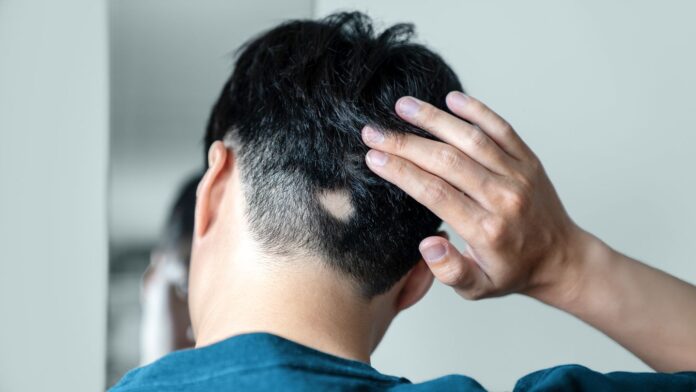Alopecia areata, an autoimmune condition causing patchy hair loss on the scalp and other body parts, affects millions of people worldwide. While not life-threatening, it can significantly impact emotional well-being, leading to anxiety or depression for those experiencing sudden hair loss. Until recently, treatment options were limited, with no FDA-approved drugs specifically targeting this condition.
Thankfully, this has drastically changed. Within just three years, the U.S. Food and Drug Administration (FDA) has approved three groundbreaking oral JAK inhibitors, offering patients new hope for managing alopecia areata and potentially regrowing lost hair. More promising medications are on the horizon, suggesting a future where effective treatments for alopecia areata may be readily available.
Targeting the Immune System: How JAK Inhibitors Work
These new drugs work by targeting the immune system’s overactive response that mistakenly attacks hair follicles. The JAK (Janus kinase) pathway is involved in inflammation regulation throughout the body. In alopecia areata, this pathway becomes dysregulated, leading to an inflammatory attack on hair follicles.
JAK inhibitors block these signals, essentially turning down the immune system’s aggression against hair follicles and allowing them to recover and produce new hair growth.
A Trio of FDA-Approved Treatments: Baricitinib, Ritlecitinib, and Deuruxolitinib
-
Baricitinib (Olumiant): The first systemic treatment for severe alopecia areata approved in 2022, baricitinib showed remarkable results in clinical trials. Around one-third of patients taking the once-daily oral medication experienced significant regrowth covering 80 percent or more of their scalp within 36 weeks. Two years into treatment, this rate jumped to 90 percent. Notably, baricitinib was already approved for rheumatoid arthritis and atopic dermatitis, meaning extensive safety data existed even before its alopecia areata indication.
-
Ritlecitinib (Litfulo): Approved in June 2023, ritlecitinib is another promising option taken once daily. It targets different proteins within the JAK pathway than baricitinib, which could be beneficial for those who don’t respond well to one type of JAK inhibitor. Importantly, it has been approved for both adults and adolescents aged 12 and older, broadening access to effective treatment options for a younger population.
-
Deuruxolitinib: The newest addition to the FDA-approved list, deuruxolitinib targets the same JAK pathway as baricitinib but with potentially greater specificity, offering further promise in managing alopecia areata.
Looking Beyond Oral Medications: New Frontiers in Alopecia Areata Treatment
While oral JAK inhibitors offer significant hope, researchers aren’t stopping there. They are actively exploring other avenues for treatment:
- Topical JAK Inhibitors: These medications are applied directly to the scalp and aim to deliver targeted treatment with fewer side effects than their oral counterparts. While challenges remain in ensuring effective penetration to the hair follicle level, research is ongoing. Early results from clinical trials have shown promise in treating smaller patches or sensitive areas like eyebrows.
-
Antibody Therapies: These therapies use specially designed antibodies that precisely target specific proteins involved in the alopecia areata process, potentially minimizing unintended effects on other parts of the body.
-
Cell-Based Therapies: Scientists are investigating using a person’s own hair follicle stem cells or lab-grown dermal papilla cells (DPCs) to regenerate new hair follicles, offering the potential for permanent hair restoration.
- Combination Approaches: Adding topical minoxidil (Rogaine), often used for hair loss in general, to JAK inhibitors is another promising avenue being explored.
A Message of Hope: Early Treatment and Ongoing Research
The landscape of alopecia areata treatment has dramatically shifted in recent years. For the first time, effective FDA-approved medications offer hope for regrowing hair and managing this condition. While there’s no one-size-fits-all solution yet, ongoing research promises even more targeted and potentially curative therapies on the horizon.
If you’re living with alopecia areata, talk to your doctor about available treatment options. Early intervention appears crucial for achieving better outcomes. Don’t hesitate to seek support from organizations like the National Alopecia Areata Foundation (NAAF), which provides valuable resources and connects individuals facing similar challenges.
